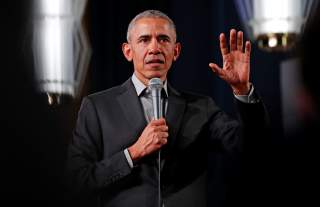space cadet
SENIOR MEMBER

How Barack Obama's Good 'Intentions' Destroyed Libya
Humanitarian crusaders trot out a variety of excuses to evade responsibility when their military interventions go awry. One frequent excuse is that a failure is because the U.S. and Western commitment to the mission was either inconsistent or insufficiently robust. Another popular explanation...

February 23, 2020 Topic: Security Blog Brand: The Skeptics Tags: LibyaBarack ObamaSamantha PowerHistoryIntervention
How Barack Obama's Good 'Intentions' Destroyed Libya
The observation that the road to Hell is paved with good intentions is especially true with respect to foreign military interventions. It is well past time for the architects of such debacles to accept responsibility for their awful handiwork.
by Ted Galen Carpenter
Humanitarian crusaders trot out a variety of excuses to evade responsibility when their military interventions go awry. One frequent excuse is that a failure is because the U.S. and Western commitment to the mission was either inconsistent or insufficiently robust. Another popular explanation for disappointing results is that the effort would have succeeded if not for malign foreign interference. That rationale has become a favorite for the architects of the Syria debacle, who contend that Russia’s intervention beginning in 2015 saved Bashar al-Assad’s beleaguered, evil regime. One striking feature is the absence of diminished confidencethat a more determined U.S.-led effort can succeed or that Washington has a moral and strategic obligation to make the attempt, even when the previous meddlesome policy has imploded.
When those excuses are not available, defenders of a failed humanitarian crusade insist that their intentions were good, and that they should be judged according to that standard. The good intentions dodge is perhaps the most maddening. Barack Obama seemed to recognize the inherent deficiency when he first met Samantha Power, an advocate of the “responsibility to protect” (R2P) doctrine, and a passionate proponent of U.S. involvement in multilateral military interventions for humanitarian goals. Obama reportedly praised Power’s book on the Rwanda genocide, but then he observed that it “seemed like malpractice to judge one’s prospects by one’s intentions, rather than making a strenuous effort to anticipate and weigh potential consequences.”
Obama was right, but he didn’t heed his own insights. Not only did he choose Power for a series of high-level policy posts when he became president, culminating in her appointment as ambassador to the United Nations, but he launched several disruptive, catastrophic interventions, most notably in Libya and Syria. The unintended negative results of those crusades continue to reverberate nearly a decade after the initial U.S. actions.
Daniel Larison, senior editor at the American Conservative, provides a provocative analysis that has the ring of truth about why humanitarian interventionists focus so heavily on their supposed good intentions.
Interventionists rarely anticipate and weigh potential consequences, because if they did that it would be much harder for them to get the interventions they want. Advocates for military action routinely minimize the risks and costs of war in order to reduce opposition to it, but “humanitarian” interventionists have another incentive to downplay negative consequences and preferably to ignore consequences in their entirety. If a “humanitarian” intervention creates worse conditions than existed prior to the intervention, it has to be declared a failure on its own terms. That is why “humanitarian” interventionists go to such lengths to turn a blind eye to the destructive effects of their interference.
Last edited:
